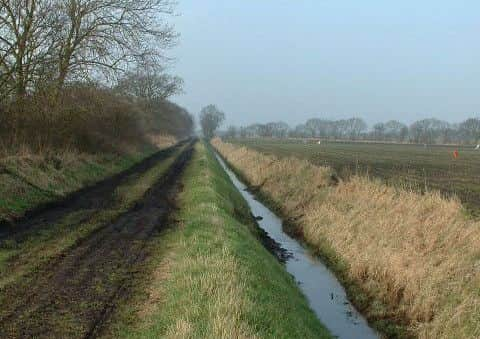The Civic Society column with David Winpenny


The target of his ire was, as the title of his sonnet that begins with these lines, makes clear, ‘On the projected Kendal and Windermere Railway’.
The poet’s Cumbrian fastness was threatened, and he didn’t like the idea at all.
Advertisement
Hide AdAdvertisement
Hide AdDespite his proclamation that he saw the Lake District as ‘a sort of national property’ (a phrase always quoted as a precursor idea for national parks), his vision was for only ‘persons of taste and discrimination’ to discover the area.


Like the poet, they would quietly walk the fells, contemplating nature and philosophising on life and death.
Now, though, the railway would bring untutored hoards from industrial towns – people who knew nothing of nature or art. They would bring ‘the ruthless change’ with ‘a false utilitarian lure.’
In letters to the newspapers he gave the opinion that ‘the imperfectly educated classes are not likely to draw much good from rare visits to the lakes performed in this way, and surely on their own account it is not desirable that the visits should be frequent... we should have wrestling matches, horse and boat races without number, and pot-houses and beer-shops would keep pace with these excitements and recreations... The injury which would be done to morals, both among this influx of strangers and the lower class of the inhabitants, is obvious.’
Advertisement
Hide AdAdvertisement
Hide AdDespite Wordsworth’s determined opposition, the railway opened in 1847.


His attitude was challenged, perhaps unexpectedly, in verse written by one of the railway’s engineers, George Heald. He wrote on behalf of ‘the thousands who shall feel/The vast advantage of a road of steel’.
He argued that the railway would ‘give to town-cramp’d souls the power to soar, / and taste the pleasures never known before.’
Wordsworth was a pre-Nimby – one of those whose ‘Not In My Back Yard’ attitude is now recognised in the Oxford English Dictionary.
Advertisement
Hide AdAdvertisement
Hide AdHe wasn’t the first to object to change in his local area, of course; no doubt there were proto-Nimbys ever since we stopped living in caves. And writers and poets have long used their pens to protest.


On 11 June 1709 Sir John Vanbrugh (a playwright before he was an architect) wrote a letter to the Duchess of Marlborough, setting out ‘Reasons Offer’d for Preserving some Part of the Old Manor’ as part of his work at the new Blenheim Palace.
‘If... this Building is taken away; there then remains nothing but an Irregular, Ragged Ungovernable Hill, the deformitys of which are not to be cured but by a Vast Expence’.
Despite this appeal to the notoriously cheese-paring Duchess, Vanbrugh lost, and the Old Manor was demolished.
Advertisement
Hide AdAdvertisement
Hide AdSixty years later Oliver Goldsmith bemoaned the loss of an ancient settlement, swept away in the pursuit of ‘enclosures’, the grabbing of village lands by landlords keen to maximise their profit at the expense of the people who had tilled the land for centuries.


In ‘The Deserted Village’ Goldsmith writes of the place he calls ‘Auburn’; ‘Amidst thy bowers the tyrant’s hand is seen, / And desolation saddens all thy green... Times are alter’d; trade’s unfeeling train / Usurp the land and dispossess the swain.’
William Cowper similarly criticised the commercial despoliation of the land; ‘Estates are landscapes, gaz’d upon a while, / Then advertis’d, and auctioneer’d away.’
Sometimes, though, it’s individual acts of vandalism that move poets; another poet, John Clare, bemoaned the loss of two elm trees, felled ‘by the savage who owns them... to make use of the benefits he can get by selling them.’ He saw them as a symptom of rapacity; ‘There once was paths that every valley wound – / Inclosure came, and every path was stopt; / Each tyrant fix’d his sign where paths were found / To hint at trespass now who cross’d the ground’.
Advertisement
Hide AdAdvertisement
Hide AdIn 1879 Gerard Manley Hopkins found that a row of poplar trees at Binsey in Oxford had been ‘All felled, felled, are all felled’ and said ‘After-comers cannot guess the beauty been. / Ten or twelve, only ten or twelve / Strokes of havoc unselve / The sweet especial scene.’
And protest poetry continued into the 20th century; John Betjeman’s satirical poem ‘The Town Clerk’s Views’ has that functionary saying, ‘I blush to think one corner of our isle / Lacks concrete villas in the modern style... Hamlets which fail to pass the planers’ test / Will be demolished. We’ll rebuild the rest / To look like Welwyn mixed with Middle West.’
Today we still protest against developments which we consider in the wrong place, like the housing proposals at West Lane in Ripon, or a motorway services at Kirby Hill.
We have planning laws that need to be obeyed, though these are not, perhaps, as stringent as they were as the Government urges ever-more house building and relaxes the rules. Protest may need to be distilled into legalise and confined to three minutes of comment at meetings of a planning committee.
Advertisement
Hide AdAdvertisement
Hide AdDoes this mean that we have lost the voice the protest poet? Certainly, the sort of protest that Wordsworth made – using his fame to try to persuade others to his point of view – seems to be no longer possible.
But there are still poetic protests; the mantle has fallen, it appears, on musicians, or on rap artists.
Protest songs are heard these days – and they might have their effect; a sung protest against the felling of many of the street trees in Sheffield has helped achieve the pausing of the programme of destruction.
In whatever way we protest, we shall continue to do so; and, as Wordsworth wrote, if we fail, nature may help: ‘if human hearts are dead, / Speak, passing winds; ye torrents, with your strong / And constant voice, protest against the wrong.’